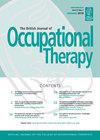在退休人员中将角色清单翻译成马来语并进行验证
IF 1.3
4区 医学
Q3 REHABILITATION
引用次数: 0
摘要
退休人员在离职后经历角色转换。因此,职业治疗师可以评估退休人员的角色,以确定他们当前角色的满意度和期望。由于马来西亚文化和语言与角色清单的起源不同,本研究旨在跨文化地将角色清单翻译和验证为马来语版本。先进行了前后翻译,然后在9名专家和20名退休人员中进行了试点测试。对122名马来西亚退休人员进行了横断面研究,以确定翻译工具的测试-重测信度,判别效度和收敛效度。角色检查表-马来语的平均内容效度指数(0.95-0.98)和平均面孔效度指数(0.92-0.96)接近完美,重测信度为良至优,类内相关系数为0.654-0.976,Cohen’s kappa符合度为中至完美(0.620-1.00)。此外,居住在社区和机构的退休人员在角色总数(p < 0.001)和期望未来角色总数(p < 0.001)上存在显著差异。角色总数与SWLS - Malay (rs = 0.593, p < 0.001)、EQ-5D-3L - Malay (rs = 0.366, p < 0.001)和MSPSS - Malay (rs = 0.314, p < 0.001)呈正相关。角色清单-马来语是马来西亚退休人员有效和可靠的工具。本文章由计算机程序翻译,如有差异,请以英文原文为准。
Translation and validation of the Role Checklist into the Malay version among retirees
Retirees undergo role transition after leaving their job. Hence, occupational therapists may assess retirees’ roles to identify their current roles’ satisfaction and anticipation. As Malaysian culture and language differed from the origin of the Role Checklist, this study aimed to translate and validate the Role Checklist into the Malay version cross-culturally. A forward–backwards translation was conducted, followed by pilot testing among 9 experts and 20 retirees. A cross-sectional study was done among 122 Malaysian retirees to identify the translated instrument’s test–retest reliability, discriminant and convergent validity. The Role Checklist – Malay achieved almost perfect Average Content Validity Index (0.95–0.98) and Average Face Validity Index (0.92–0.96), good to excellent test–retest reliability with intraclass correlation coefficients = 0.654–0.976, and moderate to perfect agreement of Cohen’s kappa (0.620–1.00). Additionally, there were significant differences in the total number of roles ( p < 0.001) and total desired future roles ( p < 0.001) between retirees living in the community and institution. The total number of roles was positively correlated with the SWLS – Malay ( rs = 0.593, p < 0.001), EQ-5D-3L – Malay ( rs = 0.366, p < .001) and MSPSS – Malay ( rs = 0.314, p < 0.001). The Role Checklist – Malay was a valid and reliable instrument among Malaysian retirees.
求助全文
通过发布文献求助,成功后即可免费获取论文全文。
去求助
来源期刊

British Journal of Occupational Therapy
REHABILITATION-
CiteScore
2.20
自引率
15.40%
发文量
81
审稿时长
6-12 weeks
期刊介绍:
British Journal of Occupational Therapy (BJOT) is the official journal of the Royal College of Occupational Therapists. Its purpose is to publish articles with international relevance that advance knowledge in research, practice, education, and management in occupational therapy. It is a monthly peer reviewed publication that disseminates evidence on the effectiveness, benefit, and value of occupational therapy so that occupational therapists, service users, and key stakeholders can make informed decisions. BJOT publishes research articles, reviews, practice analyses, opinion pieces, editorials, letters to the editor and book reviews. It also regularly publishes special issues on topics relevant to occupational therapy.
 求助内容:
求助内容: 应助结果提醒方式:
应助结果提醒方式:


